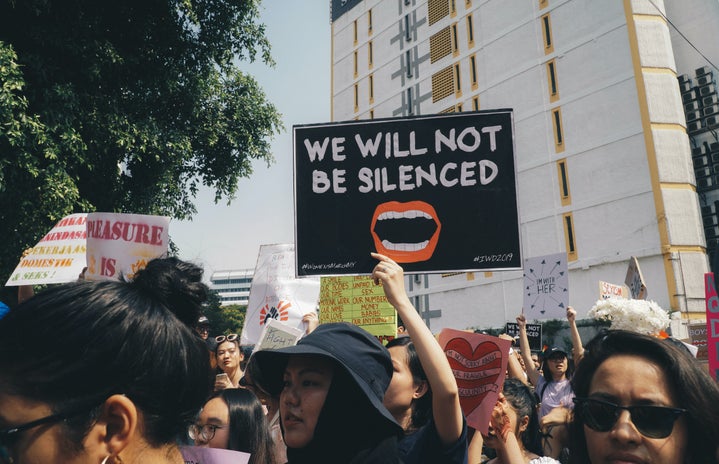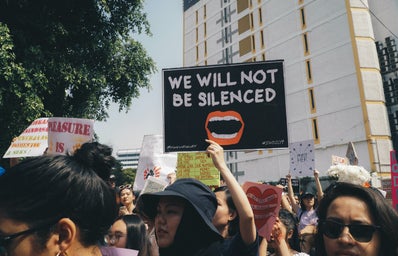It’s been a few weeks since the Atlanta spa shootings occurred, but I guarantee that for most Asians, it feels like no time has passed at all. Like too many others, that event will eventually be forgotten as the Instagram stories die down, but that won’t be the case for Asians; that day marked a moment in history where the consequences of systemic discrimination against Asians took the lives of innocent people and it was actually brought to light.
What makes it worse is that Asians have been facing undeserved and harmful backlash for a long time now and it’s gone unnoticed by the media until the dreadful day of the shooting. It says a lot about our system when the situation had to go to these extreme measures for people to finally stop dismissing our problems. It took an actual shooting with racially motivated intentions and the blood of innocent lives spilled for people to start acknowledging a tiny fraction of the discrimination that most Asians have had to face at some point in their lives, if not daily.
The truth is that sharing Instagram stories doesn’t do much to address the issue at hand if people don’t educate themselves on what they are actually sharing. Advocating to combat anti-Asian hate does not start with a post but starts with having a basic understanding of the battles that Asians have had to face as a result of societal and systemic discrimination and recognizing that those battles have hurt them.
Dealing with people cherry-picking Asian culture
Many Asians have been bullied or picked on from a young age for just “being different” whether it be because of the food we brought for lunch, the way we looked or other parts of our culture such as the way we spoke or dressed. While we love sharing our culture with people who genuinely want to learn about it, there is a prominent distinction between wanting to learn about a culture and cherry-picking parts of it.
It is offensive when people make fun of our culturally significant and traditional silk qi pao attire and then wear it as lingerie.
It is offensive when people bully Asian children and mock them for having eyes that are more slanted but then turn that into a westernized runway trend where models pull at their eyes to make them slanted too.
It is offensive when people make fun of our dumpling lunches and music, but then decide to jump on the bandwagon when it becomes popular in Western culture.
These examples don’t even scratch the surface. Cherry-picking isn’t popular and trendy. It is derogatory and is an insult to all the battles that Asians have had to face when being bullied for things when they weren’t considered “cool.”
Being forced to assimilate to avoid negative attention
This phenomenon applies to so many situations that it would be impossible to list them all, but it can be noticeably seen in our names. There are many Asians in the world that have two names: a traditional name and a westernized name. They usually end up taking a westernized name because people don’t care enough about putting in the effort to learn the proper pronunciation of their traditional name and instead use that traditional name to further perpetuate any bullying or racist remarks. Children get picked on because their name isn’t something normally heard in Western culture. What people don’t usually know is that most of these names have traditional symbolism and meaning that was carefully thought out when the name was being chosen.
In a world that supposedly prides itself on its acceptance of all differences and cultures, it’s heartbreaking to know that many Asians have had to force themselves to adopt a Western name to avoid negative attention towards their traditional name. A name that should make them feel proud, but instead makes them feel outcasted because of the way western society looks down on cultural differences.
Dealing with people who use any excuse to justify poor treatment of Asians
Attacks on Asians have been growing in number ever since the COVID-19 pandemic started because of a misconception that it was caused by Asians. People began attacking elders when they were walking down streets and started destroying small businesses through property damage. According to an Angus Reid survey, an estimated 43% of surveyed Asian-Canadians don’t feel safe in their own communities. As sad as it sounds, this sort of racially directed treatment isn’t new to Asians at all. Even though there is no justification for harm and racism, this sort of negative treatment towards Asians is being amplified during these unprecedented times because people are using a misguided excuse to justify their actions.
When you look at the countries where the COVID-19 variants came from such as England, you don’t see people calling it the “British virus” and causing physical harm to people from England. When you look at the origins of most diseases that people have dealt with such as influenza and chickenpox, most origins trace back to America and Europe. Yet, nobody uses origin as an excuse to attack people from specific countries, nor to justify verbal and physical attacks on them. This further proves that Asians are a target for this type of negative and unwanted attention regardless of what they do and that people actively try to find a reason to justify their repulsive actions towards them.
Dealing with the media portrayal of Asian stereotypes
Combating discrimination against Asians is a difficult mission to accomplish when the entertainment industry and media continuously portray Asians in a specific way and encourage these false stereotypes. Celebrities like Amy Schumer and Tina Fey are just a few examples of people that perpetuate these Asian-targeted stereotypes on their platforms and to their followers by stating that Asians have smaller vaginas or by imitating their accents. It’s seen in movies like Breakfast at Tiffany’s, where Asians are either sexualized, portrayed as a nerd or their accents are heavily exaggerated to place emphasis on the fact that they are foreign and different. This stereotype is seen almost everywhere in the media and in our everyday lives. You can see this when Ellen DeGeneres asked Constance Wu (Rachel Chu from Crazy Rich Asians) where she’s from, then Ellen looks shocked as she cheerfully stated that she’s from Richmond, Virginia.
Not only do Asians have to deal with finding their identity when they move to new countries and facing racist backlash for their existence, but they also must frequently deal with overcoming these pre-conceived negative stereotypes about who they are as a person.
Having our issues and accomplishments undermined
When an Asian person gets good grades in school or learns how to play the piano, nobody bats an eye. People dismiss their hard work and chalk up their accomplishments as happening purely because of their ethnic background, despite them pouring their blood, sweat and tears into making those accomplishments happen. This also further perpetuates imposter syndrome among Asians, where they are barely given a second glance when they accomplish something but are scrutinized when they do not.
It’s been falsely ingrained in stereotypes that Asians are good at everything, which has given people an excuse to overlook the discrimination and hate that Asians constantly face, as they are viewed by the public as a model minority group. It also contributes to people living in blind ignorance of the existence of the bamboo ceiling. The bamboo ceiling refers to the unseen barriers that prevent Asians from reaching executive and management positions. It also notes that Asians have the lowest chance of reaching those positions when compared to all other groups, despite their educational accomplishments. A study conducted showed that only 1.5% of corporate officers at Fortune 500 companies are of Asian descent.
I hope one day that people will begin to recognize us for who we are and not what they think we should be. I pray for a reality where our future generations don’t have to go through the same struggles, and they can live a life in a world that isn’t fueled by discrimination, but a world where people practice openness and equality instead of just preaching it. However, that can’t happen until people educate themselves on the battles that Asians must face and truly understand why combating anti-Asian hate is so important.
Sources:
Anti-Asian Hate Has No Place in Canada



